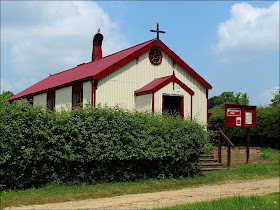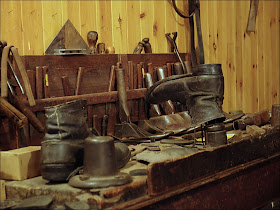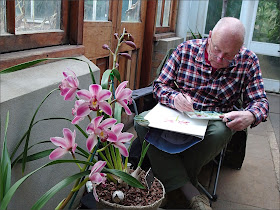Those of you who read these ramblings regularly will know that I am particularly fascinated by old churches, not through any deep religious conviction but because they are resistant to the constant changes which afflict many of our buildings. Also they reflect the quality of craftsmanship which our ancestors were capable of when they put their minds to it.
The Museum Of East Anglian Life have not managed to import a village church to their site - not so far anyway - but there is this simple non-conformist chapel, so typical of the many which sprang up across East Anglia during the nineteenth century. The museum calls it "the tin tabernacle" as the walls and roof are made of corrugated iron sheets. They rescued the building from the village of Great Moulton where it had stood since 1890.
The chapel was originally supplied as pre-fabricated, flat-pack units by Boulton And Paul, the Norwich firm who had started out as an ironmonger's shop. This must have been one of their first forays into the pre-fabricated buildings market, a field in which they made their mark during WWI, when the military had an insatiable appetite for such constructions. They also manufactured aircraft bodies, notably the Sopwith Camel.
Inside the walls and ceilings were clad with wooden boards and there was also a wooden floor. The reason that the architecture is lacking any structural features (pointed windows or doors, for example) which you might expect in even a rudimentary church building, is that these units were designed so that they could also be used as village halls or small schools.
As well as services for the adult community there would of course have been a Sunday School for the children, as these little chairs, gathered around the harmonium, testify.
The village where I grew up was too small to even support a Sunday school and the old chapel had long stood unused and neglected. However I still have in my possession a Bible which was presented to my father, "aged 9 yrs", in 1933. I asked him about it once and all he could remember was that the preacher used to shout a lot. He couldn't recall what he learned there or indeed how he'd managed to win a prize, "I don't s'pose it did us any harm though", he added.




























































